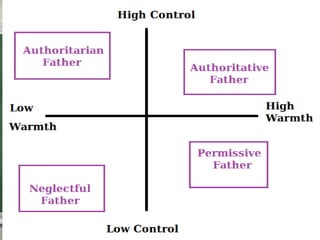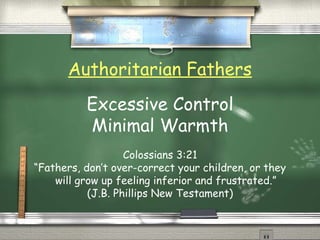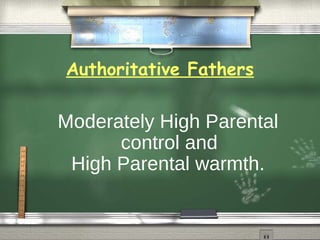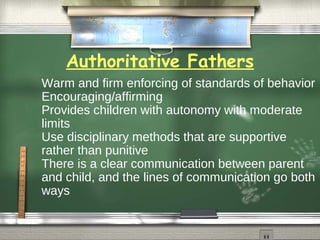God as Father
- 1. God as Our Father Relationship Between Our Understanding of Fatherhood and Our Understanding of God
- 2. Jesus told us to refer to God as “Our Father” “Our Father which art in Heaven, Hallowed be Thy Name...”
- 3. … But that guidance can be confusing for some people as their image of God is tainted by a poor image of their own father... or other fathers they see around them.
- 4. Presumably, Jesus means that God is a GOOD FATHER... Two aspects of being a father is providing nurture, and providing discipline.
- 5. The focus here is on fathers because the metaphor in the Bible of God as our father. But the role of mother overlaps greatly with that of father, and equally applies here.
- 6. Nurture: Parental Warmth… The degree to which parents are accepting, responsive, and compassionate with their children.
- 7. Parental Warmth Spectrum ------------------------------------------------------------------ Parents high | Parents who | Parents who In warmth | show little | show no warmth warmth at all HIGH WARMTH IS RECOMMENDED
- 8. Discipline: Parental Control… The degree to which parents set limits and enforce rules.
- 9. Parental Control Spectrum ------------------------------------------------------------------ Parents with | Moderate degree | Very little High degree | of control | or no control of control at all MODERATE DEGREE OF CONTROL IS RECOMMENDED
- 11. Authoritarian Fathers Excessive Control Minimal Warmth Colossians 3:21 “Fathers, don’t over-correct your children, or they will grow up feeling inferior and frustrated.” (J.B. Phillips New Testament)
- 12. Authoritarian Fathers highly demanding. expect their orders to be followed without explanation. no negotiation allowed obedience-centered disciplinary methods tend to be harsh and punitive (can be physically or emotionally abusive) the parent-child relationship is fearful and distant
- 13. Children of Authoritarian Fathers tend to be fearful, anxious have higher level of depression rebellious/defiant toward authority figures relies too much on authority for decisions lower self-esteem; feels trapped and angry but afraid to confront his parents may perform well in school, but the achievement is more to meet the parent’s high expectations.
- 14. Some Believe in an Authoritarian God God is vengeful, angry. God is a judge, looking on us disapprovingly, waiting to punish. God cannot be trusted in times of trouble. God expects us to be perfect... and maybe.... just maybe... if we are perfect enough, we can “buy” God's love.
- 15. Permissive Parents These parents have little control. They may be loving... showing warmth I Samuel 3:13 For I told him that I would judge his family forever because of the sin he knew about; his sons blasphemed God,and he failed to restrain them.
- 16. I Samuel 3:13 is a verse referring to God's message to the High Priest Eli, via young Samuel. Eli gave his sons position of power and prestige at the tabernacle... and failed to discipline them when they used this situation for their own selfish benefit.
- 17. Permissive Fathers Are overprotective Submit to their children’s whims and demands... coddling Cannot say no to their children.
- 18. Children of Permissive Fathers Are often self-centered. Are used to getting their own way Are low in social responsibility Display immature and regressive behaviors and may grow up to be infantile adults. Lack self-discipline and have little respect for others.
- 19. Some see God as a Permissive Father God is a grandfatherly type. Kind, generous... but maybe a bit out of touch with reality. God gives out good stuff if we ask... or at least ask in the right way. God can be manipulated. God doesn't really expect much from us except maybe remembering Him once in awhile... especially when we are in trouble.
- 20. Neglecting Fathers These parents have low warmth. They also provide little control Proverbs 13:24 Whoever spares the rod hates their children, but the one who loves their children is careful to discipline them.
- 21. Caution Here The term “rod” here often refers to the rod used by a shepherd, used to guide not beat. So don't be too quick to assume that this verse is about corporal punishment. Regardless, it definitely notes the link between proper guiding of children, and loving them.
- 22. Neglecting/Rejecting Fathers They fail to fulfill their responsibilities as parents; they may not be committed to the task of raising children; they may be depressed or emotionally unavailable to their children.
- 23. Children of Neglecting Parents show higher rates of delinquency, drug use and early sexual activity. perform poorly in school show disruptions in peer relations as well as cognitive development.
- 24. Some see God as a Neglectful Father God is out there somewhere but irrelevant to our lives. God cannot be relied upon to care or respond to our needs. God doesn't really care, or maybe only cares if I do something REALLY bad.
- 25. Authoritative Fathers Moderately High Parental control and High Parental warmth.
- 26. Authoritative Fathers Warm and firm enforcing of standards of behavior Encouraging/affirming Provides children with autonomy with moderate limits Use disciplinary methods that are supportive rather than punitive There is a clear communication between parent and child, and the lines of communication go both ways
- 27. Children of Authoritative Fathers Performs better in school Is less hostile and has greater self-esteem Shows more purpose and independence in their activities Is more self-reliant and more socially competent. Has positive coping skills Has clear understanding of acceptable and unacceptable behaviors
- 28. Some See God as an Authoritative Father God loves and God guides God expects us to do what is right, but is supportive when we fail. God is there when we need Him, but knows that what we want is not always what we need. God has good plans for us and disciplines us to be ready for those plans.
- 29. God as an Authoritative Father My sheep listen to my voice; I know them, and they follow me. (Provides guidance/control) I give them eternal life, and they shall never perish; (Provides warmth/care) no one will snatch them out of my hand. My Father, who has given them to me, is greater than all; no one can snatch them out of my Father’s hand. (Provides control and care) -John 10:27-29
- 30. God as an Authoritative Father “Our Father in heaven, hallowed be your name. Your kingdom come, your will be done, on earth as it is in heaven. (Control) Give us this day our daily bread, (Care) and forgive us our debts, (Care) as we also have forgiven our debtors. (Control) And lead us not into temptation, (Control) but deliver us from evil.(Care) -Matthew 6:9-13
- 31. God and Father God is provident... acting to show care and protection for His people and creation. This includes expressing love through actions that protect and help a person grow. This same quality is what a good father should have for his children (and a good mother as well). Handled properly, the metaphor of God as our heavenly Father should both help us understand God, and help us understand what it is to be a good father.
- 32. God as Our Father Relationship Between Our Understanding of Fatherhood and Our Understanding of God
































